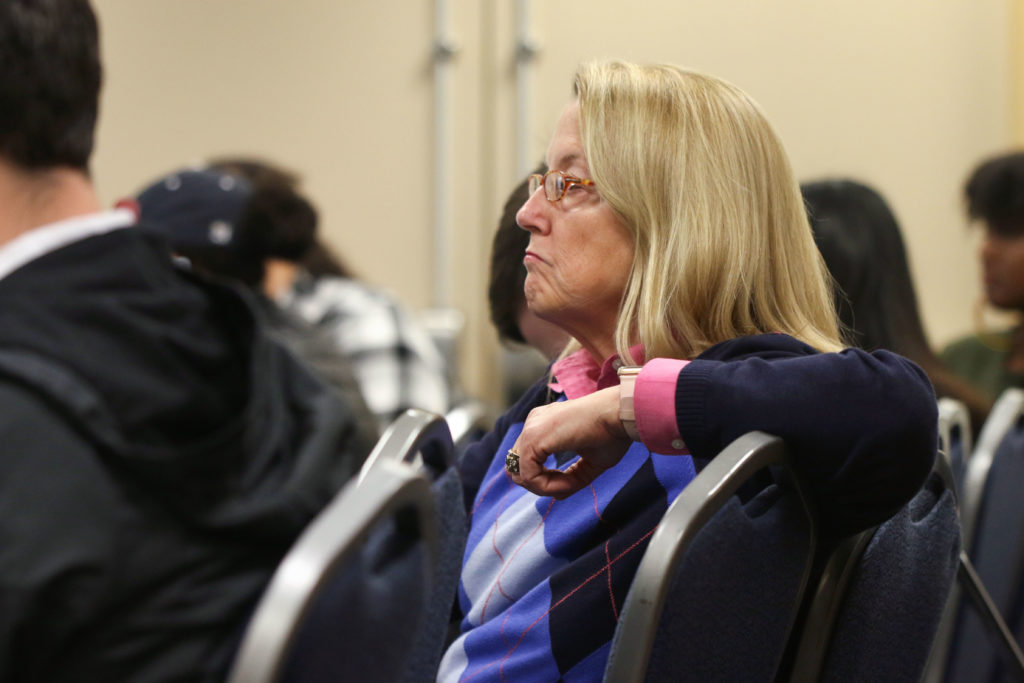More than a year and a half after the Colonial Health Center lost its first director, officials have not yet initiated a search for a permanent leader.
The center has seen three different leaders over the past 18 months after Glenn Egelman, the first head of the CHC, resigned abruptly in September 2017 after just six months in the role. Two student affairs officials have since switched off heading the center, and administrators said they have delayed a search to conduct a peer assessment and partner with a search firm.
Cissy Petty, the dean of the student experience, said officials have turned to their peer institutions to review “best practices among colleges and universities who offer an integrated model to student medical and mental health services” before launching a director search. She said officials have also visited colleagues at “a few” universities.
She said officials are seeking a search firm to help them create a job description and officially begin a search. The University will discuss the process further with student leaders and other stakeholders “at the appropriate time during the process,” she said.
“We will continue the search until we identify the most qualified candidate whose focus will be continuing an environment that promotes the health, safety and well-being of all of our students,” Petty said in an email.
Petty said counseling, medical services and health education have been a part of her job responsibilities or offices she has supervised throughout her career in student affairs. She said her experience “aligns well” with her role overseeing the CHC.
Danielle Lico, the former associate dean of students for administrative services who also had a background in health services, took over the CHC after Egelman’s departure, but her position was eliminated last summer. While heading the center, Lico also kept administrative roles in several departments, like in the Office of Student Rights and Responsibilities and the Office of Military and Veteran Student Services.
Petty also maintains administrative roles in the Office of Student Rights and Responsibilities and the Center for Student Engagement, which includes student leadership programs, residential life, student organizations, fraternities and sororities and on-campus student programming.
Petty added that Isabel Goldenberg, the medical director, and Gillian Berry, the associate director of Mental Health Services, are both “highly capable, skilled professionals” who oversee the CHC’s two main operations.
“Our entire team is dedicated to supporting students and are providing the assistance our students need to be successful,” Petty said. “As we move into the future, we will continue to look for opportunities where we can integrate our health and wellness models.”
Petty declined to say when she expects to find a permanent director for the CHC. She also declined to say how the lack of a permanent director has affected the CHC and what challenges she has faced while acting as both the dean of the student experience and the interim head of the center.
Student leaders said that without a permanent director, student feedback and concerns about health care have been neglected.
Noah Wexler, the director of student health policy for the Student Association and a member of the Student Health Advisory Council, a group of students and administrators who discuss health care concerns, said the CHC needs a leader with expertise and training in medicine and mental health.
The council went on a hiatus after the resignation of Egelman, the former associate dean of the CHC, in fall 2017.
“The CHC is more than just another student experience aspect and something that is truly, deeply involved directly and inherently in the lives of students,” Wexler said.
Peak Sen Chua, the former president of the SA and a former member of SHAC, said it is “essential” to have a permanent leader of the CHC because they can advocate for more funding from the University, clarify issues with quality of care, adequately staff the health center and ensure that student feedback is “proactively” collected and implemented.
“These issues are all very real – students have been voicing these concerns for years, and while the SA has done a lot to improve the CHC, there’s no mistake on the part of students when SA candidates prioritize CHC-related issues every spring,” Chua said in an email.
Egelman, the former director of the CHC, said the University needs a permanent director of the center to fully integrate all aspects of health care on campus, including physical and mental health.
“I think the question really comes down to what is the University’s intent regarding the provision of health care for its students on campus,” Egelman said.
Egelman said it is difficult for the center to fix its long-term problems, like a “toxic” employee culture and transparency issues, without a sole director who can focus their attention on those concerns. He said managing the daily tasks within the center is a full-time job in itself, making the job more difficult for someone who also holds other administrative responsibilities.
He added that a permanent dean could focus on enacting long-term changes in the center, like establishing a uniform digital platform and simplifying the process for making appointments. Those initiatives were part of Egelman’ two-year plan to improve the CHC, but the plan was not enacted, he said.
“It’s a great challenge to pull yourself out from the day-to-day to manage the strategic direction and to address all that’s needed to create a high-functioning integrated health care system,” he said.
Leah Potter contributed reporting.





